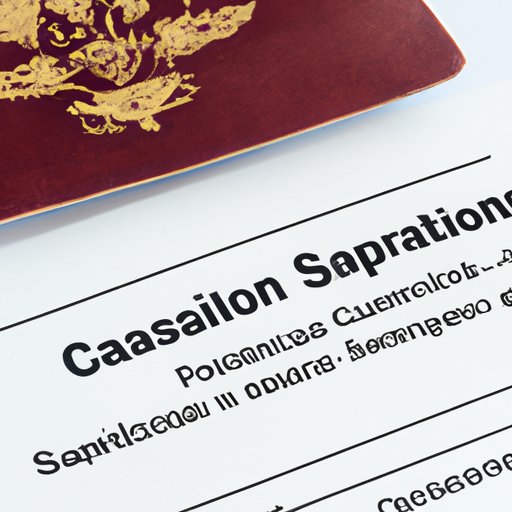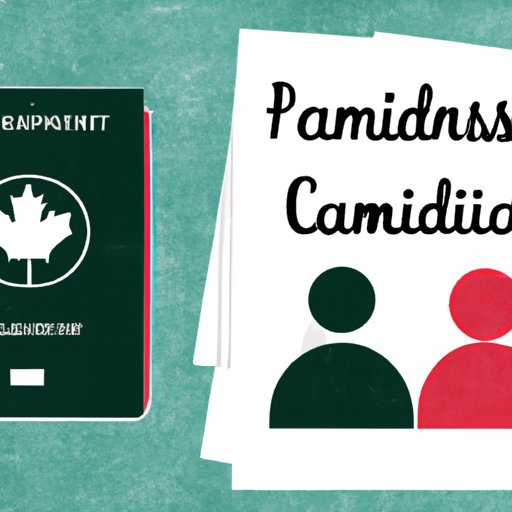Introduction
Obtaining Canadian citizenship is a coveted status that affords residents various benefits, such as the right to vote, free healthcare, and access to world-class education. Canadian citizenship also offers a sense of belonging to a diverse and welcoming nation. This article aims to provide a comprehensive guide to acquiring Canadian citizenship through various pathways, including the citizenship test, dual citizenship, skilled workers immigration program, spousal sponsorship, adopted children, refugees, and permanent residency for business owners and investors.
Guide to the Canadian Citizenship Test
To become a Canadian citizen, you may be required to take a citizenship test to demonstrate your knowledge of Canadian government, history, and values. To be eligible for the citizenship test, you must be 18 years or older, have permanent resident status, and meet the minimum language requirements.
Preparing for the citizenship test involves studying the Discover Canada guide, which contains the essential information required for the test. It is also advisable to take online practice tests and attend language classes if necessary. When booking your citizenship test, it is essential to plan ahead and ensure that you do not miss the appointment. On the test day, it is advisable to stay calm and focused, follow the instructions carefully, and take deep breaths to avoid anxiety.
Dual Citizenship Options in Canada
Dual citizenship refers to being recognized as a citizen of two countries simultaneously. Canada permits dual citizenship, which provides several benefits such as the ability to travel and work or study in both countries. To obtain dual citizenship, you must meet the eligibility criteria of both countries and follow the respective application processes.
While dual citizenship offers numerous advantages, it may also have some drawbacks, such as double taxation, travel restrictions, and military service obligations. It is essential to weigh the pros and cons before pursuing dual citizenship.
Skilled Workers Immigration Program
The Skilled Workers Immigration Program is a pathway to permanent residency and Canadian citizenship for highly skilled workers who can contribute to the Canadian economy. The program evaluates candidates based on factors such as education, language ability, work experience, adaptability, and age.
To be eligible for the program, you must meet the requirements of the National Occupational Classification (NOC) and obtain a minimum of 67 points based on the selection factors. The application process involves several stages and requires a considerable amount of documentation, such as educational transcripts, work references, language test results, and police certificates. It is essential to avoid common mistakes, such as incomplete forms or inaccurate documents.

Spousal Sponsorship and Canadian Citizenship
Spousal sponsorship refers to a process whereby a Canadian citizen or permanent resident can sponsor their spouse or common-law partner for permanent residency and Canadian citizenship. The sponsor must meet the eligibility criteria, such as age, citizenship or permanent residency status, financial stability, and lack of any criminal record.
The sponsored person must also meet certain requirements, such as being in a genuine relationship with the sponsor, passing medical and security checks, and providing necessary documents, such as a marriage certificate or proof of cohabitation. The application process involves several stages and requires a comprehensive and accurate submission.
Canadian Citizenship for Adopted Children
Adopted children may be eligible for Canadian citizenship if they meet specific criteria, such as being under the age of 18 when adopted, living in Canada with the adoptive parent(s), and having a citizenship application submitted on their behalf. The application process requires extensive documentation, such as proof of the adoptive relationship and residency in Canada.
Canadian Citizenship for Refugees
Refugees may also be eligible for Canadian citizenship through various pathways, such as the Refugee Protection Claim process, the settlement program, and the citizenship application process. To be eligible, refugees need to provide proof of identity and residence, pass security and medical checks, and meet the eligibility criteria of each pathway.
Permanent Residency for Business Owners and Investors
Several programs are available to business owners and investors who wish to obtain permanent residency and Canadian citizenship. The Start-Up Visa program is available to entrepreneurs with an innovative business idea, while the Self-Employed Persons Program targets self-employed individuals with experience in several fields. Provincial Nominee Programs allow provinces to nominate candidates who meet their unique labour market needs.
To be eligible for these programs, candidates need to meet specific criteria, including demonstrating adequate funds, providing a realistic business plan, and proving their language ability and education. It is essential to research each program’s requirements and consult with an immigration lawyer to ensure that you have sufficient documentation.
Conclusion
Acquiring Canadian citizenship may seem daunting, but the process becomes more manageable when you understand the eligibility criteria, document requirements, and application processes of each pathway. Whether you opt for the citizenship test, spousal sponsorship, skilled workers immigration program, adopted children, refugees, or business owners and investors’ permanent residency, it is essential to prepare adequately, provide accurate documentation, and stay committed to the process in pursuit of your Canadian dream.
